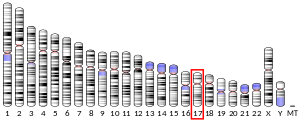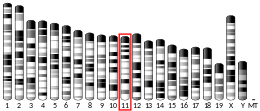CARD14
Caspase recruitment domain-containing protein 14, also known as CARD-containing MAGUK protein 2 (Carma 2), is a protein in the CARD-CC protein family that in humans is encoded by the CARD14 gene.[5][6][7]
Function
The protein encoded by this gene belongs to the membrane-associated guanylate kinase (MAGUK) family, a class of proteins that functions as molecular scaffolds for the assembly of multiprotein complexes at specialized regions of the plasma membrane. This protein is also a member of the CARD-CC protein family, which is defined by carrying a characteristic caspase-associated recruitment domain (CARD) and a coiled-coil (CC) domain. This protein thus shares a similar domain structure with the CARD10 and CARD11 proteins. The CARD domains of both proteins have been shown to specifically interact with BCL10, a protein known to function as a positive regulator of cell apoptosis and NF-κB activation. The homotypic interaction with BCL10 is believed to be prevented by the linker region of CARD14, when in an inactive state.[8] CARD14 overexpression leads to an activation of the transcription factor NF-κB and phosphorylation of BCL10. CARD14 has been shown to form a CBM signalosome, similar to the signalling of CARD11, with BCL10 and MALT1.[5][8]
Link to Psoriasis
The CARD14 gene was recently identified as the first gene directly linked to the most common form of Psoriasis. It has been suggested that a mutation in the gene plus an environmental trigger were enough to elicit plaque psoriasis.[9][10] These rare, but highly penetrant, mutations were found to disrupt an auto-inhibited state of CARD14, which leads to the binding of BCL10 and the activation of NF-κB.[8]
References
- GRCh38: Ensembl release 89: ENSG00000141527 - Ensembl, May 2017
- GRCm38: Ensembl release 89: ENSMUSG00000013483 - Ensembl, May 2017
- "Human PubMed Reference:". National Center for Biotechnology Information, U.S. National Library of Medicine.
- "Mouse PubMed Reference:". National Center for Biotechnology Information, U.S. National Library of Medicine.
- "Entrez Gene: caspase recruitment domain family".
- Bertin J, Wang L, Guo Y, Jacobson MD, Poyet JL, Srinivasula SM, Merriam S, DiStefano PS, Alnemri ES (April 2001). "CARD11 and CARD14 are novel caspase recruitment domain (CARD)/membrane-associated guanylate kinase (MAGUK) family members that interact with BCL10 and activate NF-kappa B". J. Biol. Chem. 276 (15): 11877–82. doi:10.1074/jbc.M010512200. PMID 11278692.
- Gaide O, Martinon F, Micheau O, Bonnet D, Thome M, Tschopp J (May 2001). "Carma1, a CARD-containing binding partner of Bcl10, induces Bcl10 phosphorylation and NF-kappaB activation". FEBS Lett. 496 (2–3): 121–7. doi:10.1016/S0014-5793(01)02414-0. PMID 11356195.
- Howes, A; O'Sullivan, PA; Breyer, F; Ghose, A; Cao, L; Krappmann, D; Bowcock, AM; Ley, SC (12 April 2016). "Psoriasis mutations disrupt CARD14 autoinhibition promoting BCL10-MALT1-dependent NF-κB activation". The Biochemical Journal. 473 (12): 1759–68. doi:10.1042/BCJ20160270. PMC 5810350. PMID 27071417.
- Jordan CT, Cao L, Roberson ED, Duan S, Helms CA, Nair RP, Duffin KC, Stuart PE, Goldgar D, Hayashi G, Olfson EH, Feng BJ, Pullinger CR, Kane JP, Wise CA, Goldbach-Mansky R, Lowes MA, Peddle L, Chandran V, Liao W, Rahman P, Krueger GG, Gladman D, Elder JT, Menter A, Bowcock AM (May 2012). "Rare and common variants in CARD14, encoding an epidermal regulator of NF-kappaB, in psoriasis". American Journal of Human Genetics. 90 (5): 796–808. doi:10.1016/j.ajhg.2012.03.013. PMC 3376540. PMID 22521419.
- Jordan CT, Cao L, Roberson ED, Pierson KC, Yang CF, Joyce CE, Ryan C, Duan S, Helms CA, Liu Y, Chen Y, McBride AA, Hwu WL, Wu JY, Chen YT, Menter A, Goldbach-Mansky R, Lowes MA, Bowcock AM (May 2012). "PSORS2 is due to mutations in CARD14". American Journal of Human Genetics. 90 (5): 784–95. doi:10.1016/j.ajhg.2012.03.012. PMC 3376640. PMID 22521418.
External links
- Human CARD14 genome location and CARD14 gene details page in the UCSC Genome Browser.
Further reading
- Wang L, Guo Y, Huang WJ, et al. (2001). "Card10 is a novel caspase recruitment domain/membrane-associated guanylate kinase family member that interacts with BCL10 and activates NF-kappa B." J. Biol. Chem. 276 (24): 21405–9. doi:10.1074/jbc.M102488200. PMID 11259443.
This article incorporates text from the United States National Library of Medicine, which is in the public domain.



